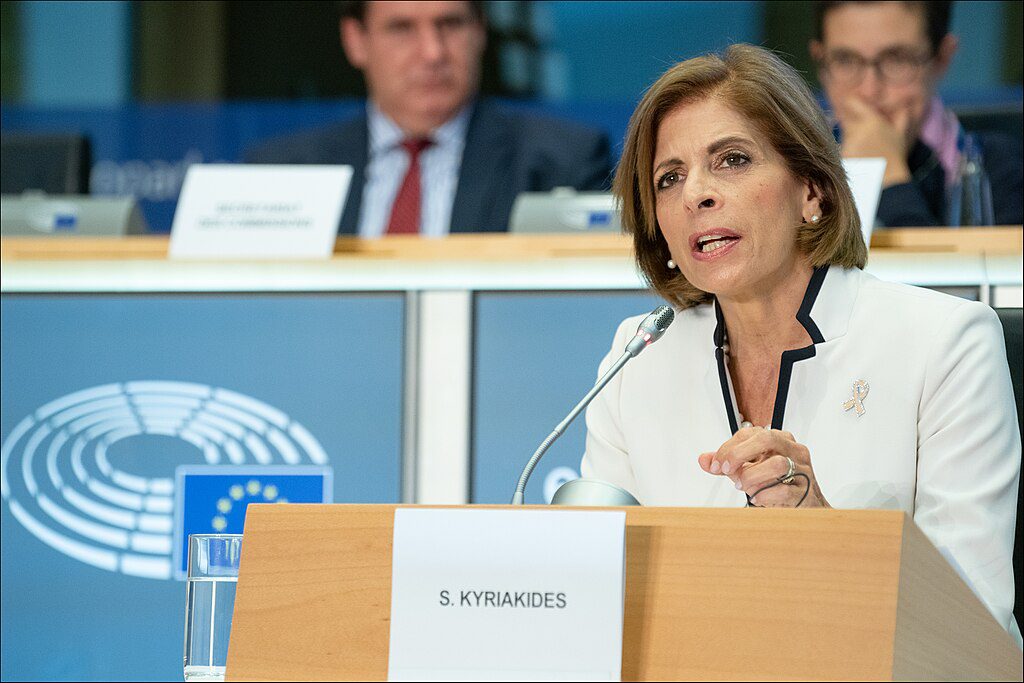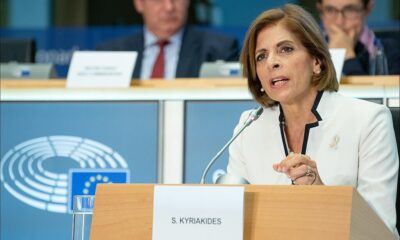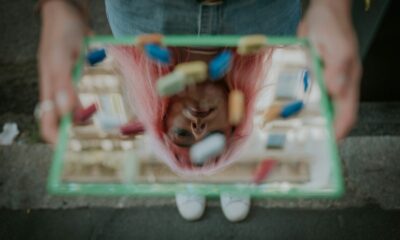Health & Society
Over 6 million illegally exported pills seized in international operation against psych drug trafficking network

18 October 2024|PRESS RELEASE — Drug trafficking – A criminal group that had set up an international smuggling route for prescription pills was taken down during a large-scale operation coordinated from Eurojust’s headquarters. Romanian, Estonian, Finnish and Serbian authorities, supported by Eurojust and Europol, arrested 47 people and seized over 6 million pills.
The criminal group, which operated throughout Europe, bought pills from other criminal networks in Serbia. The pills, used to treat anxiety, seizures and insomnia, were then hidden in tyres, in cars, which were transported on lorries, and in clothing to be taken to Romania and Estonia. After arriving in Romania or Estonia, the pills were transported on to the Nordic countries. Members of the criminal group in Finland and Norway acted as distributors and sold the pills on the streets. The sale of the pills was highly profitable for the criminal group. The pills seized during the operations done by the national authorities has a market value of approximately EUR 12.5 million.
To dismantle the intricate network of criminals, the Romanian authorities launched an investigation into the group. Given the transnational nature of the criminal group, with activities in Romania, Estonia, Finland, and Serbia, international cooperation between the authorities started, supported by Eurojust and Europol.
A joint investigation team (JIT) was set up at Eurojust between Romanian, Estonian, Finnish and Serbian authorities to collect and exchange information and evidence directly, and carry out joint operations.
To investigate the activity of the criminal group, special investigative techniques such as control delivery and undercover investigator were successfully used by the authorities of all the countries involved. To this end, Eurojust facilitated the coordination and execution in Hungary, Slovakia, Poland, Lithuania and Latvia of European Investigation Orders issued by Romania. Following these actions, 39 people were arrested, and more than 4 million prescription pills were seized.
After these measures, the JIT continued their investigations to halt the activities of the criminal group and bring them to justice.
A large-scale international operation on 17 October coordinated from Eurojust’s headquarters in The Hague, led to the arrest of 14 people in Romania, 11 people in Serbia and 1 person in Finland. 41 houses searches were carried out simultaneously in Romania, 19 in Serbia and one in Finland.
Items seized during the operation include large quantities of pills, cash, mobile phones, firearms and luxury cars. 2 houses have been also seized in Romania. Europol facilitated the overall operation by liaising with the operating authorities, processing the available data and deploying two specialists with mobile offices to support the action day.
The following authorities were involved in the actions:
- Romania:
- Prosecution Office attached to the High Court of Cassation and Justice
- Directorate for Investigation of Organized Crime and Terrorism
- Oradea Territorial Office
- General Inspectorate of the Romanian Police
- Directorate for Combating Organized Crime
- Department for Special Operations
- Central Intelligence Analysis Unit of the Romanian Police;
- General Inspectorate for Border Police – Bors, Nadlac and Petea Offices
- Estonia:
- Northern District Prosecutor’s Office
- Police and Border Guard Board, Northern Prefecture, Crime Bureau, Drug and Organised Crime Unit
- Finland:
- Prosecution District of Southern Finland
- Helsinki Police Department and National Prosecution Authority
- Serbia:
- Public Prosecutor’s Office for Organized Crime
- Criminal Investigations Directorate
- Service for Combatting Organized Crime
- Department for Combating Organized Drug Smuggling

Health & Society
EU Commissioner Stella Kyriakides Reaffirms EU’s Commitment to Ukraine’s Healthcare

Support includes medical evacuations, mental health services, and integration into EU health programs
In a video message addressed to the Ukrainian Ministry of Health Conference, European Commissioner for Health and Food Safety, Stella Kyriakides, underscored the European Union’s steadfast commitment to support Ukraine “in all respects, and for as long as it takes.” Joined by Ukraine’s Minister of Health, Viktor Liashko, Commissioner Kyriakides highlighted the extensive assistance the EU is providing to bolster Ukraine’s healthcare sector amid ongoing challenges.
Immediate Medical Support and Evacuations
Commissioner Kyriakides announced that, to date, more than 3,500 Ukrainian patients have been transferred to hospitals across the EU and the European Economic Area (EEA) through the EU Civil Protection Mechanism. This initiative aims to alleviate the burden on Ukraine‘s healthcare facilities and ensure that patients receive the necessary medical care. “Our support to Ukraine regarding the healthcare sector includes immediate needs like medical evacuation,” she stated.
Enhancing Mental Health and Psychosocial Services
Recognizing the profound psychological impact of the conflict, the Commissioner emphasized the importance of mental health support. The EU has provided financial assistance to the International Federation of Red Cross and Red Crescent Societies to aid individuals who have fled Ukraine or have been internally displaced. Efforts are also underway to strengthen access to mental health services for children, one of the most vulnerable groups affected by the crisis. “We are helping Ukraine to strengthen access to mental health services for children,” Kyriakides noted.
Rehabilitation Programs and EU Health Integration
The European Union is assisting Ukraine in improving rehabilitation services for wounded civilians and veterans. Ukraine’s inclusion in the EU4Health funding program has opened numerous opportunities for collaboration in the health sector. In June of the previous year, the EU concluded further arrangements for deeper cooperation with the Ministry of Health of Ukraine. “Ukraine’s work with our European Reference Networks enabled additional financial support for the Ukrainian Hub for Rare Diseases at the Children’s Hospital in Kyiv,” the Commissioner highlighted.
Strengthening Emergency Preparedness and Response
Commissioner Kyriakides praised Ukraine’s participation in the board of the Health Emergency Preparedness and Response Authority (HERA), emphasizing the importance of joint efforts in health emergency preparedness. In collaboration with the World Health Organization (WHO) Regional Office for Europe, a project has been launched to enhance Ukraine’s capacity to address chemical, biological, radiological, and nuclear (CBRN) threats. “Together with WHO Europe, we have launched a project to build capacity in Ukraine to address CBRN threats—an area where we must continue to work and prepare together,” she asserted.
Pathway Towards EU Integration
Affirming the European Union’s support for Ukraine’s future within the EU, Commissioner Kyriakides stressed the ongoing efforts to assist Ukrainian authorities in meeting accession requirements. “Ukraine’s alignment with EU standards will improve economic resilience, create new supply chains, and strengthen sectors such as pharmaceuticals,” she stated. The Commissioner underscored that the negotiations will require leadership, determination, and focus, with successful reforms being key to progress. “Getting reforms right will be key. Our support for Ukraine in this process is a given,” she added.
Solidarity and Shared Future
Concluding her message, Commissioner Kyriakides reaffirmed the EU’s profound commitment to supporting Ukraine. “We stand together in your fight for freedom and democracy, and we will work together towards a future of stability, resilience, and partnership,” she declared. She extended her wishes for a fruitful conference discussing the integration of Ukrainian and EU healthcare systems. “I wish you a fruitful day discussing the integration of Ukrainian and EU healthcare,” she said.
Health & Society
The Resident, Netflix’s medical series that exposes medical corruption in the US

OPINION.- The Resident, is a Netflix medical series that uncovers medical corruption in the United States. It emerges in January 2018 and its 107 chapters end in 2023. In 6 seasons they build a solid argument from fiction about the poor health ethics of large medical corporations, pharmaceuticals, hospital centers and groups of doctors who only think about billing to make profits.
The interesting thing about the narrative, created by Amy Holden Jones, Haley Schore, and Roshan Sethi, among others, is that it can denounce issues that by passing “only” in the dystopia of the fictional narrative have little chance of being actionable: any resemblance to reality is pure coincidence. However, among its more than 100 chapters are enclosed not inconsiderable approaches to the darkest and most sinister reality of medicine and its business, collected by the screenwriters through conversations held with honest doctors and nurses.
A professor at a university in Oregon recently told me that a student of his had to go to a doctor’s office to get a splinter removed because his “bullshit” insurance did not cover it. In another office they gave him, as if it were a gift, some absorbent cotton and some alcohol so that he could do it himself, something that in the end he had to do without any medical control or the required asepsis. This drama affects millions of students who are dramatically excluded from the healthcare system. Perhaps the Democrats and Republicans should iron out their differences on this issue by sitting down and talking about it.
The Resident, was cancelled in January 2023 with a stable and loyal audience. The producers are clear that such cancellation could have to do with pressure from media groups linked to the most important medical clans of the moment.
One of the most outstanding themes of the first two seasons has to do with cancer and the business behind the supposed remission therapies, one of the doctors at Chastain Park Memorial Hospital in Atlanta, the fictitiously named hospital where the various plots take place, owns a series of centers related to the care of terminally ill cancer patients where chemotherapy is administered. In connection with this issue, in real life, Professor of medicine and drug analysis Peter C. Gotzsche, author of, among other books, How to Survive in an Overmedicated World, tells the story of a 64-year-old relative of his with metastatic pancreatic cancer, diagnosed as incurable, who was willing, like so many other patients when informed of their condition, to do everything possible to try to live a little longer, …he underwent twenty-seven radiation treatments in Denmark, after consulting a different doctor each time. He then underwent surgery in Germany, thanks to an agreement between two hospitals, one Danish and one German, where an experimental treatment was used on him where the doctor who treated him …experimented by mixing white blood cells with the cancer cells and reintroducing them into the patient by monthly injections to strengthen his immune system. This last treatment, which was implemented after the intervention in Germany was not free and each injection cost a bundle. A year and a half after starting this journey, Peter’s relative passed away. Doctors have always affirmed with him and other patients that every chemo treatment prolongs life (1).
In different parts of the world, not only in the USA, health authorities approve cancer drugs without knowing exactly what the results of their application will be. All this causes a great deal of expense to the health system and to the patients and families themselves, often leaving them with substantial debts. Who wins? The pharmaceutical companies that make these compounds and a series of medical commission agents and hospitals that, by applying them indiscriminately to extend the patient’s life for a few months, receive large incomes or huge profits. The Resident, in a masterful way, shows us the corruption we are describing in a surprising visual form.
Dr. Andrew Wakefield published in the 2010s a rigorous study, where apparently the CDC (Center for Disease Control and Prevention) in the United States, would have decided to hide – with the help of corrupt scientists and medical associations, laboratories and media linked to power – the relationship between mercury in vaccines and various neural pathologies – especially in children. He was professionally prosecuted for carrying out this study. Some time later, Dr. William W. Thomson, CDC epidemiologist, who participated in the concealment, admitted that it had been real (2).
Throughout the planet, studies on the dangerousness of the drugs we take, even if they are usually taken without a prescription and without consulting our pharmacists, are constantly being disseminated . Let us not forget that pharmacies are stores that sell products and that with each pill they give us, they make money. In my case, I am hypertensive and when we managed to find the little pill that could help me lower my blood pressure, after three attempts, the first thing my family doctor advised me was not to read the indications of the side effects it could produce. However, to give us an idea, without going into the subject, which I will develop further, Joan Ramón-Laporte, Professor of Therapeutics and Clinical Pharmacology at the Autonomous University of Barcelona (UAB), commented in his book Chronicle of an intoxicated society …How do adverse effects manifest themselves? What are the diseases caused by drugs? And behind these two simple questions he began to make an extensive list of which I will only mention a few lines: …hives, stomach pain, diarrhea, dizziness, loss of balance, amnesia, tachycardia, sweating, choking sensation, infection, heart attack, stroke, depression, falls, fractures, cancer… Practically all pathologies can be caused by drugs ( 3).
We may not be aware of where what we read leads us, but if we are diagnosed with a condition, whatever it may be, and we are medicated more, we are entering a wheel where our system deteriorates and becomes weaker and weaker. Falling, then, into the wheel of overmedication is easy and it could end our own lives.
The Resident, the series we are talking about, emphasizes, as did the mythical series House, on diagnosis. Are we well diagnosed with what we have? Taxatively no. Returning to Peter C. Gotzsche’s book How to Survive in an Overmedicated World, in its introduction he leaves us the following paragraph that should be engraved in the hearts of patients who regularly visit their doctors: I wish patients who leave all decisions in the hands of their doctors the best of luck, because they will need it. Doctors make numerous errors of judgment, often because they are ignorant and use too many medications. We live in a world so over-diagnosed and over-treated that, in the richest countries, they are the third leading cause of death after heart disease and cancer. Peter also comments that it has been found that medical errors, such as those due to medication and other reasons, are the third leading cause of death in the world even if we count only hospital deaths, most of which are preventable.
In short, the series The Resident, from the Netflix platform, narrates somber aspects about the world of medicine, of course without overloading to the extreme the denunciation, impossible in a society where the control of large corporations through their lobbies is part of the entertainment industry and the media, thus controlling part of what is said, how it is said and when it is said. Although the latter is not only the case in the United States.
(1 and 3) Como sobrevivir a un mundo sobremedicado, by Peter C. Gotzsche, Roca Editorial de Libros, S.L. ISBN: 9788417541552
(2) Discovery DSALUD, nº 177 – December 2014
Health & Society
OSCE Workshop Tackles Rising Drug Crisis Among Youth in Central Asia

Dushanbe, Tajikistan – 3 October 2024 – In an urgent response to the escalating drug crisis impacting youth across Central Asia, the Organization for Security and Co-operation in Europe (OSCE) convened a regional workshop focusing on the prevention of drug use and the supply of new psychoactive substances (NPS). The two-day event, held on 2 and 3 October, brought together over 40 experts, policymakers, and law enforcement professionals from various Central Asian nations, alongside representatives from several international organizations, including the United Nations Office on Drugs and Crime (UNODC) and the European Union.
During the workshop’s opening session, Maksudjon Duliyev, the head of the UNODC office in Tajikistan, expressed grave concerns regarding the global drug crisis, citing the latest World Drug Report, which revealed that 292 million people worldwide engage in drug use, yet only one in eleven individuals with drug use disorders receives adequate treatment. “Behind these numbers are real lives—families forever changed by this crisis,” Duliyev stated, underscoring the human toll of the epidemic.
Duliyev further highlighted the rising threat from NPS, reporting that 566 new substances were identified globally in 2022, with 44 classified as new, underscoring the urgent need for effective prevention strategies targeting vulnerable youth populations.
Ambassador Willy Kempel, head of the OSCE Programme Office in Dushanbe, reiterated the gravity of the situation, linking it to established drug production and smuggling routes originating from neighboring Afghanistan. “The critical need for regional collaboration cannot be overstated,” Kempel remarked, emphasizing the necessity of cultivating ongoing cooperation efforts to combat the drug crisis effectively.
Addressing the same issues, Miguel de Domingo, Head of Unit for Security, Peace, and Development at the Fundación Internacional y para Iberoamérica de Administración y Políticas Públicas (FIIAPP), pointed to the rapid proliferation of NPS as a new challenge for public health. “The role of digital platforms in the distribution of NPS is particularly concerning,” de Domingo noted, calling for increased monitoring and regulation to curb the growing influence of these substances among young people.
Throughout the workshop, participants engaged in discussions surrounding various pertinent topics, including emerging trends in drug trafficking, risk and protective factors influencing NPS use, and the critical role of international cooperation in establishing early warning systems and rapid response strategies. The emphasis on evidence-based prevention programs tailored specifically for young people was a focal point of many discussions, illustrating a commitment to addressing the unique challenges faced by this demographic.
The event concluded with a call for joint efforts and sustained cooperation across countries to effectively mitigate the threats posed by NPS and other illicit drugs. As Central Asia grapples with this pressing issue, the urgency for collaborative action and innovative prevention strategies has never been clearer, promising a more cautious future for the region’s youth.
-

 Sports6 days ago
Sports6 days agoItaly, Daniel Maldini doesn’t hide his excitement
-

 Africa6 days ago
Africa6 days agoThe European Union and Morocco: Navigating Trade Relations and Geopolitical Issues
-

 Sports6 days ago
Sports6 days agoNations League: Italy poker, overcome Israel. Azzurri one step away from the quarters
-

 Sports5 days ago
Sports5 days agoPhysical problem in national team: Piotr Zielinski scares Inter Milan.
-
EU & the World6 days ago
Is the Stock Market Open Today? What to Know About the Markets
-

 Health & Society6 days ago
Health & Society6 days agoThe Resident, Netflix’s medical series that exposes medical corruption in the US
-

 EU & the World6 days ago
EU & the World6 days agoWhere to Watch the Dodgers vs. Mets Game: Where to Stream & Watch the NLCS Live
-

 Sports6 days ago
Sports6 days agoJuventus, Paul Pogba speaks out about his future



















